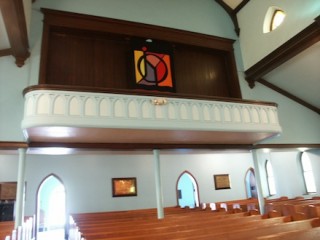
The upper balcony of the Tabernacle Baptist Church
On a hot afternoon in July, young children are sifting through clothing, household items, food, and toiletries in the Caring Corner at the Tabernacle Baptist Church in Utica. Their families, mostly Karen refugees from Burma, are the newest, but largest, percentage of the churchŌĆÖs congregation.
ŌĆ£Because the kids are the ones who speak English, many of them do the shopping for their families,ŌĆØ explained Nathan Lynch ŌĆÖ14. ŌĆ£The church converted their balcony into a store to give out supplies to the refugees because food stamps only go so far; plus, they canŌĆÖt buy non-edibles with them.ŌĆØ
This scene of a religious institution addressing the needs of its shifting community is just one that Lynch has witnessed while conducting research this summer on the melting pot of religious diversity found in Utica, 30 miles from Ėį▒Š╩ėŲĄ.
ŌĆ£I am building five journalistic profiles that both reflect trends in the city and feed into the changes that are happening,ŌĆØ said Lynch. ŌĆ£The city has a dynamic immigrant population that is filling the void left by the aging of other ethnic groups who traditionally resided there. So weŌĆÖre seeing religious buildings, and even whole church denominations, start to cater to the needs of these new citizens.ŌĆØ
Lynch, a news editor at the , became interested in spending a summer delving more deeply into this phenomenon after last fall for the paperŌĆÖs ŌĆ£Portraits of BeliefŌĆØ ŌĆö a series chronicling aspects of religion on campus and in the surrounding community.
He wrote about a Bosnian Islamic group in Utica who purchased a former Methodist church and converted it into a mosque. ŌĆ£This was happening at the same time as the Ground Zero mosque debacle,ŌĆØ explained Lynch. ŌĆ£So, there were these two contrasting stories, one of controversy and this other of community support.ŌĆØ Religion professor Georgia Frank, who has visited the mosque with her classes, saw the article. ŌĆ£She told me, ŌĆśYou could turn this into a whole summer research project.ŌĆÖŌĆØ
In addition to interviewing clergy and congregation members, Lynch, an English/creative writing and history double major, attends services and Sunday schools, and does historical research to provide context to these contemporary situations. The Scarborough, Maine, resident is keeping a blog called Diversity and Devotion in Utica and hopes to publish his work in the Maroon-News, as well as in an external religion journal.
Lynch, who is pursuing a youth-oriented angle for some of his profiles, said that two strong themes have emerged: ŌĆ£One is of communities being revitalized and new congregations starting. The other is of walls of ethnicities breaking down.ŌĆØ In addition to Tabernacle Baptist Church, Lynch is also writing about:
- A traditionally Syrian and Lebanese Antiochian Orthodox church that has attracted converts from many other religions and parts of the world;
- A Buddhist temple whose members are mainly Vietnamese;
- The increasingly diverse membership of the oldest, largest Catholic church in Utica; and
- Two 19th-century women from the region canonized as Catholic saints this year, Kateri Tekakwitha, the first Native American saint, and Marianne Cope, who ministered to lepers in HawaiŌĆÖi.
In true journalistic fashion, LynchŌĆÖs portraits will cover both the positives as well as the challenges and controversies faced by the communities, from poverty to cultural clashes.
